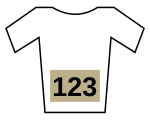|
Combativity award in the Tour de France
The combativity award is a prize given in the Tour de France for the most combative rider overall during the race. Historically, it favored constant attackers as it was based on the distance spent in a breakaway, included winning checkpoints and outright stage wins. Today, the winner is chosen by a jury.[1] Besides the overall winner, the jury also awards a combativity award to the most aggressive rider at the end of each stage, with this rider allowed to wear a golden number the following race day. The 1981 Tour de France marked the last time the winner of the general classification also won the combativity award. HistorySince 1952,[2] after every stage the most combative cyclist was given an award, and an overall competition was recorded.[3] At the end of the 1956 Tour de France, André Darrigade was named the most attacking cyclist.[4] At this point, the award was given the same importance as the award for the cyclist with the most bad luck, Picot in 1956. In 1961, the award was not given to an individual cyclist, but to the entire West-South-West regional team. The system of the award has changed over the years. Historically, riders accumulated points, and the cyclist with the most points at the end of the Tour was declared the winner.[5] The cyclist did not have to finish the race; for example, in 1971, Luis Ocaña crashed out while wearing the yellow jersey on the Col de Menté in stage 14, and in 1972, Cyrille Guimard wore the green jersey in second place overall when he withdrew, but both were still given the combativity award. In 1979, the combativity award was initially given to Joop Zoetemelk;[6] however, Hennie Kuiper received the final award. In a system that was implemented in 2003, a jury of eight specialists in cycling selected the most combative cyclist of each stage (excluding time trials), with the classification for most distance in breakaway groups only part of the decision.[7] There is no jersey for the most combative rider of the previous stage, but he can be recognized by the race number worn on his back: it consists of a black number on a golden background instead of the usual black on white.[8] From 1998 until 2022, it consisted of a white number on a red background.[9][7] At the end of the Tour de France, a "super-combativity award" is given to the most combative cyclist of the race. As of 2017[update], the total prize money for the super-combativity award winner is €20,000.[10] From 2023, the number will be golden, following sponsorship by real estate company Century 21.[8] WinnersOverall super-combativity award winners since 1953.[11] Notes
References
|
||||||||||||||||||||||
